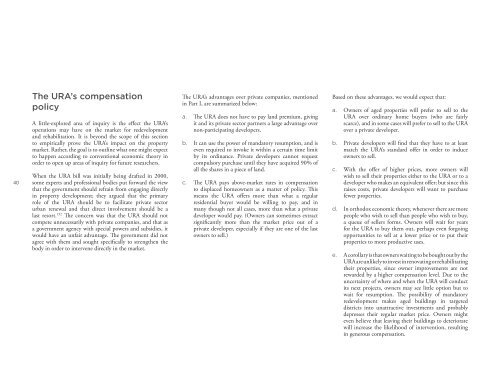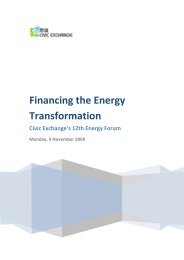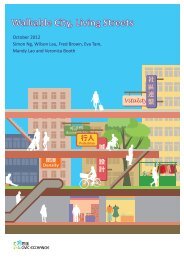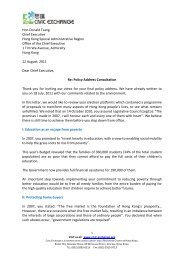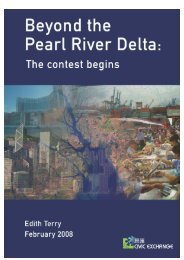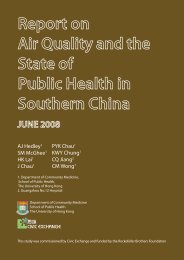40The URA’s compensationpolicyA little-explored area <strong>of</strong> inquiry is <strong>the</strong> effect <strong>the</strong> URA’soperations may have on <strong>the</strong> market for redevelopmentand rehabilitation. It is beyond <strong>the</strong> scope <strong>of</strong> this sectionto empirically prove <strong>the</strong> URA’s impact on <strong>the</strong> propertymarket. Ra<strong>the</strong>r, <strong>the</strong> goal is to outline what one might expectto happen according to conventional economic <strong>the</strong>ory inorder to open up areas <strong>of</strong> inquiry for future researchers.When <strong>the</strong> URA bill was initially being drafted in 2000,some experts and pr<strong>of</strong>essional bodies put forward <strong>the</strong> viewthat <strong>the</strong> government should refrain from engaging directlyin property development; <strong>the</strong>y argued that <strong>the</strong> primaryrole <strong>of</strong> <strong>the</strong> URA should be to facilitate private sectorurban renewal and that direct involvement should be alast resort. 152 The concern was that <strong>the</strong> URA should notcompete unnecessarily with private companies, and that asa government agency with special powers and subsidies, itwould have an unfair advantage. The government did notagree with <strong>the</strong>m and sought specifically to streng<strong>the</strong>n <strong>the</strong>body in order to intervene directly in <strong>the</strong> market.The URA’s advantages over private companies, mentionedin Part I, are summarized below:a.b.c.The URA does not have to pay land premium, givingit and its private sector partners a large advantage overnon-participating developers.It can use <strong>the</strong> power <strong>of</strong> mandatory resumption, and iseven required to invoke it within a certain time limitby its ordinance. Private developers cannot requestcompulsory purchase until <strong>the</strong>y have acquired 90% <strong>of</strong>all <strong>the</strong> shares in a piece <strong>of</strong> land.The URA pays above-market rates in compensationto displaced homeowners as a matter <strong>of</strong> policy. Thismeans <strong>the</strong> URA <strong>of</strong>fers more than what a regularresidential buyer would be willing to pay, and inmany though not all cases, more than what a privatedeveloper would pay. (Owners can sometimes extractsignificantly more than <strong>the</strong> market price out <strong>of</strong> aprivate developer, especially if <strong>the</strong>y are one <strong>of</strong> <strong>the</strong> lastowners to sell.)Based on <strong>the</strong>se advantages, we would expect that:a.b.c.d.e.Owners <strong>of</strong> aged properties will prefer to sell to <strong>the</strong>URA over ordinary home buyers (who are fairlyscarce), and in some cases will prefer to sell to <strong>the</strong> URAover a private developer.Private developers will find that <strong>the</strong>y have to at leastmatch <strong>the</strong> URA’s standard <strong>of</strong>fer in order to induceowners to sell.With <strong>the</strong> <strong>of</strong>fer <strong>of</strong> higher prices, more owners willwish to sell <strong>the</strong>ir properties ei<strong>the</strong>r to <strong>the</strong> URA or to adeveloper who makes an equivalent <strong>of</strong>fer; but since thisraises costs, private developers will want to purchasefewer properties.In orthodox economic <strong>the</strong>ory, whenever <strong>the</strong>re are morepeople who wish to sell than people who wish to buy,a queue <strong>of</strong> sellers forms. Owners will wait for yearsfor <strong>the</strong> URA to buy <strong>the</strong>m out, perhaps even forgoingopportunities to sell at a lower price or to put <strong>the</strong>irproperties to more productive uses.A corollary is that owners waiting to be bought out by <strong>the</strong>URA are unlikely to invest in renovating or rehabilitating<strong>the</strong>ir properties, since owner improvements are notrewarded by a higher compensation level. Due to <strong>the</strong>uncertainty <strong>of</strong> where and when <strong>the</strong> URA will conductits next projects, owners may see little option but towait for resumption. The possibility <strong>of</strong> mandatoryredevelopment makes aged buildings in targeteddistricts into unattractive investments and probablydepresses <strong>the</strong>ir regular market price. Owners mighteven believe that leaving <strong>the</strong>ir buildings to deterioratewill increase <strong>the</strong> likelihood <strong>of</strong> intervention, resultingin generous compensation.
From <strong>the</strong> point <strong>of</strong> view <strong>of</strong> private developers, we mayadditionally expect that:a.b.Private redevelopment will become more unattractivedue to <strong>the</strong> increased costs <strong>of</strong> having to compete with<strong>the</strong> URA, which enjoys indirect subsidies and taxbreaks.Conversely, waiting for <strong>the</strong> URA to absorb <strong>the</strong> costs<strong>of</strong> resumption, and <strong>the</strong>n participating in joint ventureprojects with <strong>the</strong> URA would be more attractive.Essentially, we would expect that <strong>the</strong> URA will displacea certain amount <strong>of</strong> private sector redevelopment andrehabilitation, and secondly that <strong>the</strong> URA might actuallyfoster perverse incentives against building maintenance.These conclusions are by necessity based on heavilysimplified economic assumptions, and in real life <strong>the</strong>re maybe many confounding factors. Thorough statistical researchwill have to be conducted in order to ascertain whe<strong>the</strong>r, andto what extent, <strong>the</strong>se two hypo<strong>the</strong>ses hold true.However, <strong>the</strong>re is some anecdotal evidence to support<strong>the</strong>m. Firstly, <strong>the</strong>re are a few concrete examples <strong>of</strong> <strong>the</strong> URAdisplacing private sector projects and entering into biddingwars with <strong>the</strong> private sector. The Staunton Street project isone such example, where Henderson Land went to courtto exclude its land from mandatory resumption. There wasano<strong>the</strong>r similar example in Sham Shui Po, where a privatedeveloper, Golden Light Services, had been planningto redevelop a section <strong>of</strong> Hai Tan Street in joint venturewith <strong>the</strong> owners since <strong>the</strong> 1990s, but whose project wascancelled because <strong>the</strong> site was folded into a larger URAredevelopment plan. 153 Additionally, <strong>the</strong> Sneaker Streetproject was an example where a private developer workingwith disgruntled shop owners entered into a bidding waragainst <strong>the</strong> URA, driving up costs.As for building maintenance, <strong>the</strong> Hong Kong HousingSociety has noted that one obstacle to persuading people t<strong>of</strong>orm owners’ management corporations is that <strong>the</strong> ownersprefer to wait for redevelopment instead. 154 Lau Ping-Cheung, who was a non-executive director <strong>of</strong> <strong>the</strong> URAand represented <strong>the</strong> architecture, surveying and planningsectors in LegCo also shared this view. In a 2003 debate onmandatory building inspections, he said:“Not only were large amounts <strong>of</strong> public funds requiredto subsidize a small number <strong>of</strong> owners who refuseto shoulder <strong>the</strong>ir own responsibility <strong>of</strong> repairs andmaintenance, this is also being unfair because awrong signal will be sent and owners are indirectlyencouraged, by dint <strong>of</strong> <strong>the</strong> handsome compensations<strong>of</strong>fered by <strong>the</strong> URA in acquisition, not to carry outrepairs and maintenance and let <strong>the</strong>ir buildings fallinto disrepair in order to wait for acquisition <strong>of</strong> <strong>the</strong>irbuildings by <strong>the</strong> URA. Therefore, it is necessary for<strong>the</strong> Government to review <strong>the</strong> present acquisition andcompensation system as soon as possible.” 15541
- Page 7: The Local Context:Evolving Communit
- Page 10 and 11: Hong Kong Urban Design ConcernsHong
- Page 12 and 13: 12In 1998, the Planning Department
- Page 14 and 15: Part I:14The URA —A Redevelopment
- Page 16 and 17: Version 2:The Urban RenewalAuthorit
- Page 18 and 19: URA Ordinance vs.Urban Renewal Stra
- Page 20 and 21: How The URA WorksThe Cycle ofResump
- Page 22 and 23: PART II:22The PoliticalEconomyof th
- Page 24 and 25: The Institutional ContextNationaliz
- Page 26 and 27: 26traditionally given the Lands Dep
- Page 28 and 29: 28maximum allowable plot ratio —
- Page 31 and 32: Left: Multi-ownership with inadequa
- Page 33 and 34: Weak building maintenanceregulation
- Page 35 and 36: Lack of FinancingOne significant pr
- Page 37 and 38: Left: Graham Streetrequirement. 137
- Page 39: Left: Graham Streetthe 1970s to ind
- Page 43 and 44: The Built EnvironmentPart I discuss
- Page 45 and 46: Left: The K11 shopping mall, hotel,
- Page 48 and 49: Box 4Calculating Plot RatioPlot rat
- Page 50 and 51: 50Standardized ArchitectureStandard
- Page 53 and 54: Left: Langham Place, blank facade o
- Page 56 and 57: 56Figure-ground diagram of Langham
- Page 58 and 59: 58This page: Footbridge network ove
- Page 61: Left: Wo Tik Street - the only acti
- Page 65 and 66: Public Open Spaces and Pedestrian P
- Page 67 and 68: The MertonThe Merton in Kennedy Tow
- Page 69 and 70: Left: The widened pavement along Sh
- Page 71 and 72: Langham PlaceThere are often paveme
- Page 73 and 74: Recreational Public Open SpacesQuan
- Page 75: Hanoi Road K11 Open SpaceSize: 1,20
- Page 78 and 79: 78Clockwise from left: The ground f
- Page 81 and 82: The MertonTotal size (sites A and B
- Page 83 and 84: General ObservationsLandscapingGene
- Page 85: The URA also announced that it had
- Page 88 and 89: Box 6The Counterproductive Pursuito
- Page 91 and 92:
Opposite, clockwise from top right:
- Page 93 and 94:
Social ImpactSocially sustainable d
- Page 96 and 97:
Left: Western Market has become pri
- Page 98 and 99:
98This spread from left: This anony
- Page 100 and 101:
Top: A naturally gentrified street
- Page 102 and 103:
102Comprehensive redevelopment disp
- Page 104 and 105:
104Luxury shopping at the K11 mall
- Page 106 and 107:
106A building rehabilitated by the
- Page 108 and 109:
According to town planner Ian Brown
- Page 110 and 111:
110
- Page 112 and 113:
112Wan Chai Market. Built in 1937,
- Page 114 and 115:
114
- Page 116 and 117:
116
- Page 118 and 119:
118Conclusion
- Page 120 and 121:
120
- Page 122 and 123:
Appendix 1Name of projectAddress/lo
- Page 124 and 125:
Name of projectAddress/locationArea
- Page 126 and 127:
126Endnotes1 HKSAR Planning Departm
- Page 128 and 129:
128110 Chan, B. W. (2002), “The h
- Page 130:
Room 701, Hoseinee House,69 Wyndham


